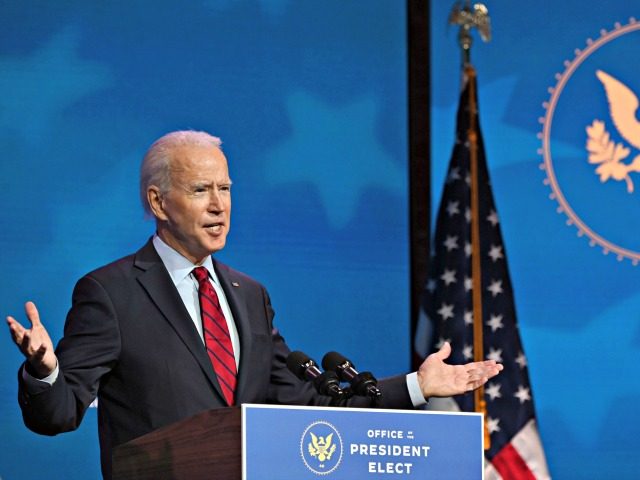The electoral college on Monday voted in all 50 states and the District of Columbia to make Democrat former Vice President Joe Biden formally now the president-elect of the United States.
Biden, who won 302 electoral votes to President Donald Trump’s 232 electoral votes, officially became the president-elect of the United States late Monday when California, shortly after 5:30 p.m. on the east coast, cast its 55 electoral votes for the Democrat. From as early as 10:00 a.m. eastern time on the east coast, throughout the day, electors formally voted to elect Biden president. Hawaii is the last state to vote, and will cast its four electoral votes for Biden later Monday evening. When Hawaii casts its votes, Biden is expected to finish with 306 electoral votes–the same amount that Trump won the 2016 election with.
There were no faithless electors, and all the electors cast their votes in accordance with the popular vote of their state.
President Trump is still challenging the results of the election in several states, many of which saw Republicans slate or attempt to slate alternative electors in case his as-of-yet unsuccessful challenges end up eventually succeeding.
Trump’s challenges remain ongoing in Georgia, Michigan, Wisconsin, Pennsylvania, Arizona, and Nevada, each of which saw their states’ electors formally vote for Biden on Monday. Each of those states had previously certified their election results, showing Biden wins in each.
Since the Nov. 3 election, Trump and his lawyers have been mounting bids to overturn the results in those various states, and pressuring state officials including governors, secretaries of state, and GOP-led state legislatures in many of the states in question to bend his way. So far, the president’s efforts have been unsuccessful but have led to recounts, hearings, protests, and investigations from coast to coast.
During the past month-plus since the election, Trump and the General Services Administration (GSA) blocked Biden’s access to the government to run a formal transition team. Eventually, the GSA and Trump allowed Biden to have access to the government office space and classified briefings and information so Biden can prepare to stand up a government, assuming he holds on and is inaugurated in January.
The next step occurs on Jan. 6, when the new Congress will hear from the electoral college and certify its vote. There is likely to be a challenge from Trump ally Rep. Mo Brooks (R-AL) there, and Trump White House official Stephen Miller said on Monday that the president intends to fight all the way until Jan. 20, 2021—the only date contained in the Constitution that clearly spells out a specific moment in the transfer of power on Inauguration Day—to try to overturn Biden’s victory.

COMMENTS
Please let us know if you're having issues with commenting.